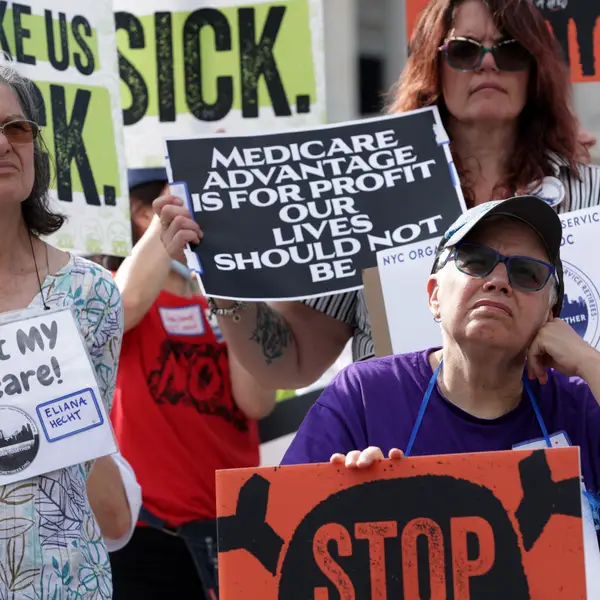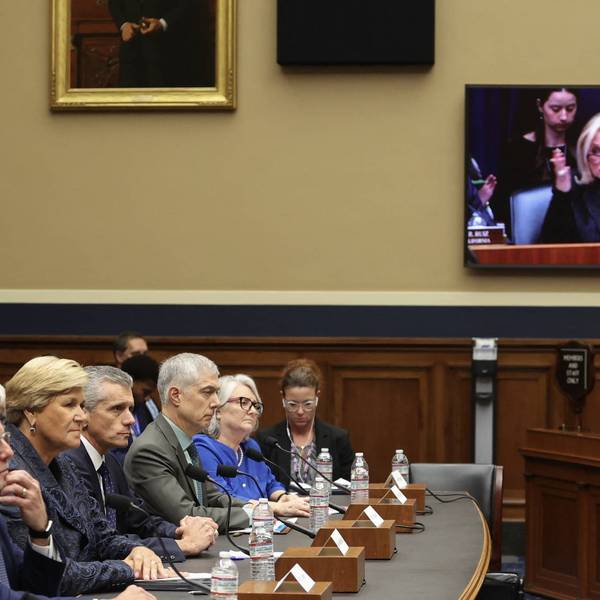Legislation unveiled Thursday by two House progressives would ban private insurers from using the "Medicare" label in plan titles and advertising, an effort to curb misleading marketing practices that for-profit health giants have used to expand their reach at great costs to patients and the federal government.
Introduced by Reps. Mark Pocan (D-Wis.) and Ro Khanna (D-Calif.), the Save Medicare Act would change the official name of Medicare Advantage (MA) to "Alternative Private Health Plan" to make clear that such coverage is offered by for-profit companies.
"' Medicare Advantage' is just private insurance that profits by denying coverage, and the name is being used to trick seniors into enrolling. That's not right," Khanna said in a statement. "This bill will prevent these private insurers from labeling themselves as 'Medicare' and allow us to focus on strengthening and expanding real Medicare instead."
To deter for-profit companies from using the Medicare name in its health insurance advertising, the bill proposes levying a $100,000 penalty for each use of the label in the title of a private plan.
According to the latest data from the Kaiser Family Foundation, more than 28 million people--nearly half of the eligible Medicare population--are currently enrolled in MA plans that are supposed to follow rules set by Medicare, which funds the privately run plans.
In practice, as The New York Times demonstrated this past weekend, MA is rife with fraud as private insurance giants frequently attempt to overbill Medicare, which funds the private plans that often skimp on care.
"The health system Kaiser Permanente called doctors in during lunch and after work and urged them to add additional illnesses to the medical records of patients they hadn't seen in weeks," the Times reported, detailing a scheme to make patients appear sicker in order to reap more government money. "Doctors who found enough new diagnoses could earn bottles of Champagne, or a bonus in their paycheck."
"Anthem, a large insurer now called Elevance Health, paid more to doctors who said their patients were sicker," the newspaper added. "And executives at UnitedHealth Group, the country's largest insurer, told their workers to mine old medical records for more illnesses--and when they couldn't find enough, sent them back to try again."
Despite longstanding accusations of fraud and abuse, MA plans continue to receive generous funding from the federal government. Earlier this year, the Centers for Medicare and Medicaid Services announced that the private plans will see an average 8.5% revenue boost next year, one of the program's largest-ever pay hikes.
"Only Medicare is Medicare. It is one of the most popular and important services the government provides," Pocan said Thursday. "We should be working to expand this service to include coverage for dental, vision, and hearing care, as well as looking at ways to strengthen it rather than allowing these 'Medicare Advantage' programs to provide pale alternatives to what Medicare does."
"These non-Medicare plans run by private insurers undermine traditional Medicare," Pocan continued. "They often leave patients without the benefits they need while overcharging the federal government for corporate profit."
The Save Medicare Act, Pocan argued, would eliminate "any confusion about what is--and what is not--Medicare" and ensure that "this essential program will continue to serve seniors and other Americans for years to come."
The new bill was announced days before the October 15 start of Medicare's open enrollment period, which comes as advocates continue to raise alarm over the Biden administration's decision to rebrand and sustain a Medicare privatization effort that began during Donald Trump's presidency.
Now known as ACO Reach, the program has been dubbed "Medicare Advantage on steroids."
"So-called Medicare Advantage is neither Medicare nor an advantage," said Wendell Potter, president of the Center for Health and Democracy. "It is simply another scheme by the insurance companies to line their pockets at the expense of consumers."
Diane Archer, president of Just Care USA and an outspoken critic of both Medicare Advantage and ACO Reach, said that "Medicare is a national treasure, delivering real value to millions of older adults and people with disabilities."
"Corporate insurance plans too often lean on Medicare's good name to mislead people into signing up with them," Archer added. "Rep. Pocan and Rep. Khanna's bill would put an end to this practice."




